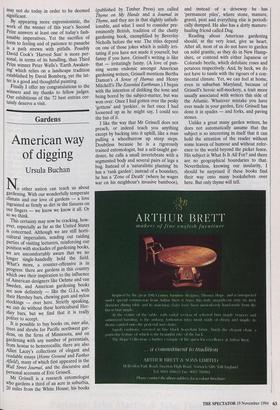Gardens
American way of digging
Ursula Buchan
No other nation can teach us about gardening. With our wonderfully temperate climate and our love of gardens — a love ingrained as firmly as dirt in the fissures on Our fingers — we know we know it all. Or SO we think.
This certainty may now be cracking, how- ever, especially as far as the United States is concerned. Although we are still horti- cultural imperialists, sending out raiding Parties of visiting lecturers, reinforcing our position with stockades of gardening books, we are uncomfortably aware that we no longer single-handedly hold the field. What's more, a counter-offensive is in progress: there are gardens in this country which owe their inspiration to the influence Of American designers like Oehme and van Sweden, and American gardening books are now definitely — like the G.I.s, with their Hershey bars, chewing gum and nylon stockings — over here. Strictly speaking, we can do without these horticultural Her- shey bars, but we find that it is really politer to accept. It is possible to buy books on, inter alia, trees and shrubs for Pacific northwest gar- dens, on the ferns of Minnesota, and on gardening with any number of perennials, from hostas to hemerocallis; there are also Allen Lacey's collections of elegant and readable essays (Home Ground and Farther Afield), many of which first appeared in the Wall Street Journal, and the discursive and personal accounts of Eric Grissell.
Mr Grissell is a research entomologist who gardens a third of an acre in suburbia, 20 miles from the White House; his books (published by Timber Press) are called Thyme on My Hands and a Journal in Thyme, and they are in that slightly unfash- ionable, and what I used to consider pre- eminently British, tradition of the chatty gardening book, exemplified by Beverley Nicholls before the war. The titles depend on one of those jokes which is mildly irri- tating if you have not made it yourself, but funny if you have. Grissell's writing is like that — irritatingly funny. (A love of pun- ning seems endemic amongst American gardening writers; Grissell mentions Bertha Damon's A Sense of Humus and Henry Mitchell's The Essential Earthman.) I began with the intention of disliking the tone and being bored by the subject-matter, but was won over. Once I had gotten over the pesky `gotten' and 'pesides', in fact once I had loosened up as he might say, I could see the fun of it.
I like the way that Mr Grissell does not preach, or indeed teach you anything except by backing into it uphill, like a man pulling a wheelbarrow up steep steps. Doubtless because he is a rigorously trained entomologist, but a self-taught gar- dener, he calls a small invertebrate with a segmented body and several pairs of legs a bug. Instead of a 'naturalistic planting' he has a 'rank garden'; instead of a boundary, he has a 'Zone of Death' (where he wages war on his neighbour's invasive bamboos), and instead of a driveway he has `permanent piles', where stone, manure, gravel, peat and everything else is periodi- cally dumped. He also has a dotty manure- hauling friend called Dug.
Reading about American gardening should, at the very least, give us heart. After all, most of us do not have to garden on solid granite, as they do in New Hamp- shire, or contend with either Japanese or Colorado beetle, which defoliate roses and potatoes respectively. And, by heck, we do not have to tussle with the rigours of a con- tinental climate. Yet, we can feel at home, even in suburban Maryland, because of Grissell's heroic self-mockery, a trait more usually associated with writers this side of the Atlantic. Whatever mistake you have ever made in your garden, Eric Grissell has done it in spades — and forks, and paving stones.
Unlike a great many garden writers, he does not automatically assume that the subject is so interesting in itself that it can hold the attention of the reader without some leaven of humour and without refer- ence to the world beyond the picket fence. His subject is What Is It All For? and there are no geographical boundaries to that. Nevertheless, knowing our insularity, I should be surprised if these books find their way onto many bookshelves over here. But only thyme will tell.


















































































 Previous page
Previous page